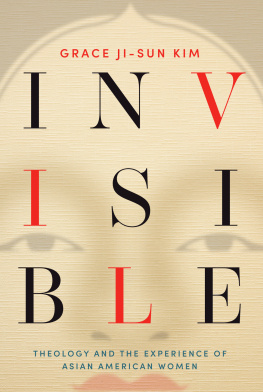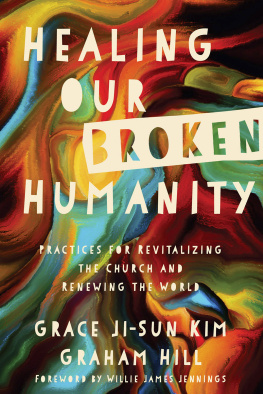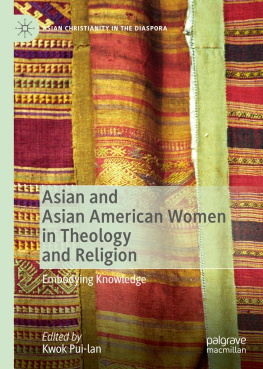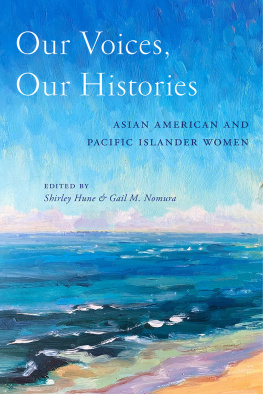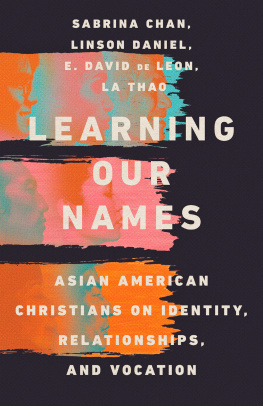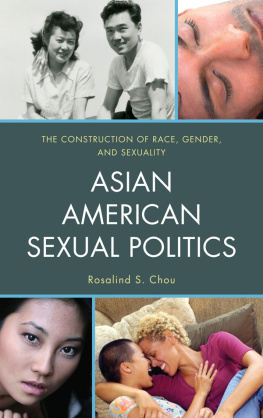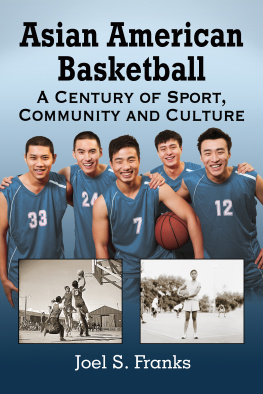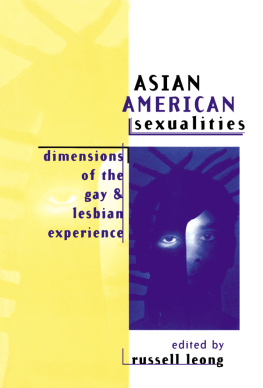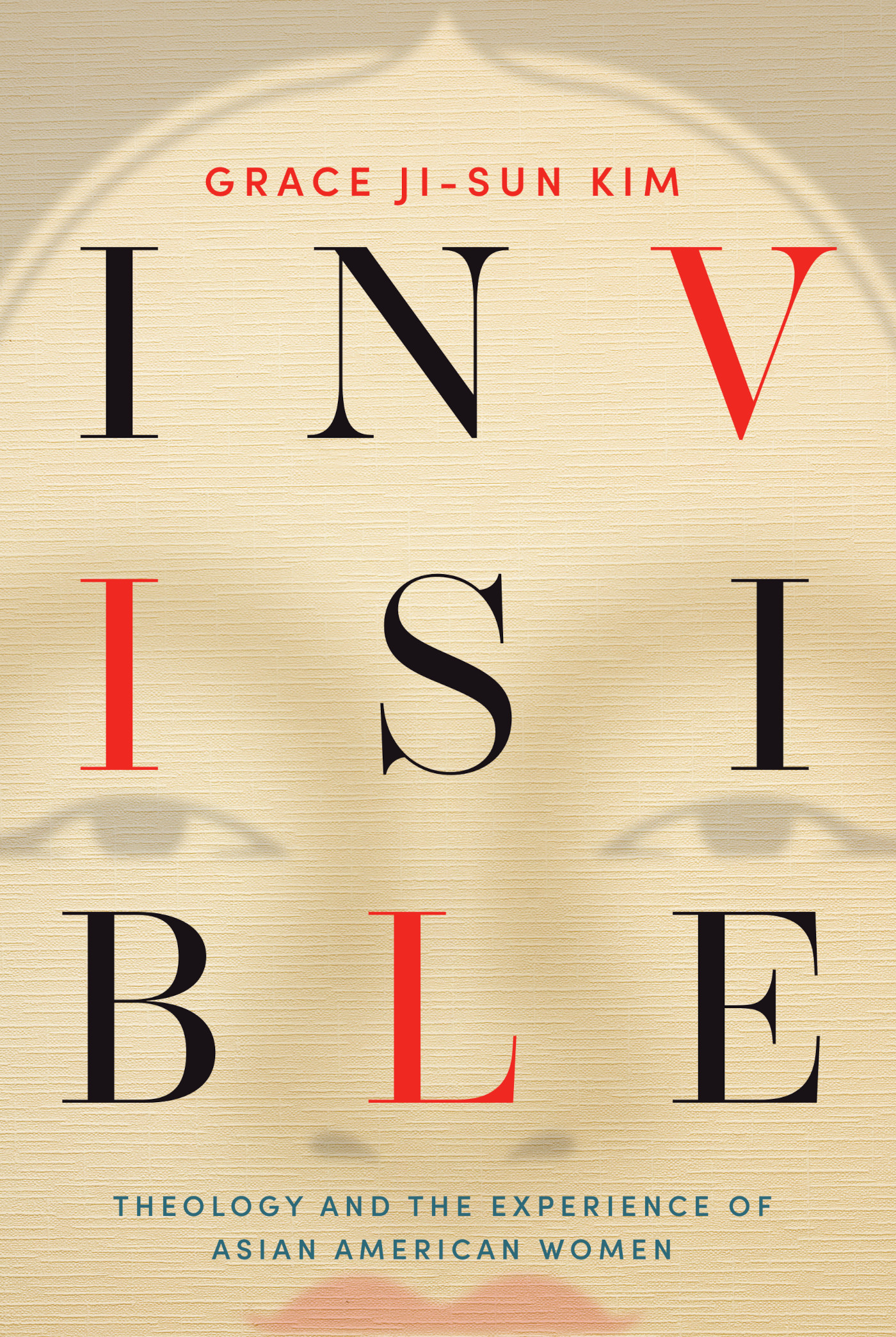
Praise for Invisible
Combining moving personal narratives and social history, this timely book challenges anti-Asian racism and internalization of white norms that contribute to the invisibility of Asian Americans. It uses an intersectional approach to articulate a theology of visibility that decenters whiteness and offers a vision for our collective future. Written in an accessible way, this book can be used in classrooms, churches, and adult forums.
Kwok Pui Lan, Candler School of Theology, Emory University
Without Grace Ji-Sun Kims work, the invisible would not have been made visible and we, especially males, would remain in the dark about the sufferings and travails of Asian women immigrants in the United States. Kims Invisible is an eloquent clarion call to steep American theology in the sufferings and pains and joys and hopes of Asian women. I most strongly recommend this book to all Americans, especially in the current anti-immigration climate.
Peter C. Phan, Ignacio Ellacuria Chair of Catholic Social Thought, Georgetown University
Invisible opens our eyes to the long history of racism, discrimination, and xenophobia that Asian Americans have faced and are facing. We need a theology of visibility to start embracing, welcoming, and loving one another. I highly recommend this book.
Susan M. Shaw, professor of women, gender, and sexuality studies, Oregon State University
In Invisible, Kim moves with deft sensitivity between concepts of invisibility and erasure, historic legacy and nuanced contemporary reflection, unearthing how a theology of visibility can help redefine the self-knowledge and understanding of Asian Americans and pave the path for new generations to embrace their story as an essential element of the American experience. In this season, love, hope, visibility, and unity matter.
Rev. Jesse Jackson Sr., president and founder of Rainbow PUSH Coalition and author of Keeping Hope Alive
With great skill and clarity, Grace Ji-Sun Kim reveals the extent of how Asian patriarchy and white supremacy have rendered Asian American women invisible. In deconstructing myopic perceptions of God that have denied spiritual equality, Kim is informed by her personal story and unwavering commitment to biblical justice. This book is vital for churches to celebrate the essential role of Asian and Asian American women as leaders in a truly global Christianity, in which a tapestry of voices brings dignity to all.
Todd M. Johnson, co-director, Center for the Study of Global Christianity, Gordon-Conwell Theological Seminary
Grace Ji-Sun Kims Invisible is as provocative as it is alluring. She draws on her own experiences and stories to unveil the hidden discrimination and racism faced by Asian Americans and how we can move toward a theology of visibility that is consequential during this time.
Rev. Graham Joseph Hill, associate professor and principal, Stirling Theological College, Australia (University of Divinity)
Invisible
Invisible
Theology and the Experience of Asian American Women
Grace Ji-Sun Kim
Fortress Press
Minneapolis
INVISIBLE
Theology and the Experience of Asian American Women
Copyright 2021 Fortress Press, an imprint of 1517 Media. All rights reserved. Except for brief quotations in critical articles or reviews, no part of this book may be reproduced in any manner without prior written permission from the publisher. Email or write to Permissions, Fortress Press, PO Box 1209, Minneapolis, MN 55440-1209.
Scripture quotations are from New Revised Standard Version Bible, copyright 1989 National Council of the Churches of Christ in the United States of America. Used by permission. All rights reserved worldwide.
Cover image: Shutterstock/LanKS
Cover design: Brad Norr
Print ISBN: 978-1-5064-7092-4
eBook ISBN: 978-1-5064-7094-8
While the author and 1517 Media have confirmed that all references to website addresses (URLs) were accurate at the time of writing, URLs may have expired or changed since the manuscript was prepared.
Contents
The Invisible Me
Invisibility persists throughout the Asian American story. Occupying a vague social status, the Asian American has long been perceived as a deferential foreigner, an individual with economic significance who exercises their inherent diligence in academic and professional spaces but possesses little social importance. The Asian American remains meek in the dominant American imaginationtaking place in the quiet, homogenous, resigned, productive, and advancing enclaves of society. While a sense of rapid growth, competence, and social apathy dominates the present stereotype of Asian Americans, only a century ago, Asian Americans were perceived as illiterate, unappealing, filthy and disease-ridden, unassimilable and marginal members of the human race who were denied the right to become naturalized American citizens and were instead segregated to isolated ethnic enclaves.
Despite the various challenges Asian Americans have faced, they are rarely considered worthy of discussing as a community because they do not seem to contend with the same limitations and polarizing concerns that other racial minorities seem to face. As a result, Asian Americans are widely excluded from mainstream discussions of race in this country, erased into obscurity amid an American racial paradigm that shifts obsessively between Black-and-white oppositions. Asian Americans do not fit in on either side and thus remain in an unstable state where they can be designated as good or bad depending on political tempersbecoming emblems of the model minority one moment and foreign threats the next.
Even more indiscernible in Americas racial landscape are Asian American women. The compounded effects of a patriarchal Asian culture and a white-dominant American culture are formidable, steadily removing these women from Americas field of vision. Most Asian American women occupy a more enclosed, hidden sociocultural space than their male counterparts. They are not afforded the same responsibilities or freedoms within their communities, and outside of their communities, they are often forced to challenge the stereotypical image of the Asian American female that predominates: a submissive, sexualized, exotic being. Subsequently, most Asian American women have been denied their agency and have had their distinctive voices stifled behind community walls. Such invisibility, particularly in regard to issues pertaining to gender discrimination and sexual or domestic violence, has continued the legacy of shame that courses through the history of all Asian women. Furthermore, the Asian American churcha place where immigrants have gathered for safe, separate congregation and socialization outside white societyputs women in places of secondary importance, relegating their work to domestic, supportive roles meant to uplift male leaders and organizers. In a place that provides the opportunity for leadership, particularly in a society that permits sparse room for Asian American leaders, these churches deny women the chance for empowerment. The strong patriarchal framework both in the church and in Asian culture perpetuates such ongoing marginalization. The hybrid, liminal spaces that Asian American women occupy turn into barely visible shadows. It is vital that Asian American women resurrect their histories, experiences, and stories from obscurity.
My story is like many who were born in Asia and brought to America: we are immigrant children who psychologically live within our parents generational sacrificeoften in a state of reparation for their sufferingswhile also harboring our own growing personal ambitions and desires to explore ourselves outside of familial and cultural expectations. My story is not much different from women in my mothers generation or those who came before her. However, unlike them, I have the opportunity to share not just my own story but the stories of Asian American women in a historical and contemporary context. In doing so, I hope to provide greater insight into the Asian American female consciousness so others can gain a better understanding of our history and interpretation of the world.
Next page
